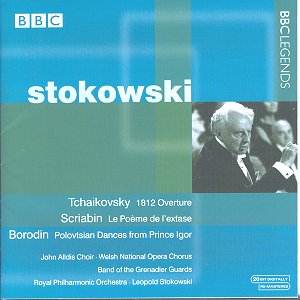RUSSIAN ORCHESTRAL MUSIC
Modest MUSSORGSKY (1839-1881): Night
on the Bare Mountain [9.31]
(Orch. Rimsky-Korsakov, arr. Stokowski)
Mikhail Ivanovich GLINKA (1804-1857):
Kamarinskaya [6.20]
Dmitri SHOSTAKOVICH (1906-1975):
Prelude in E flat minor, Op. 34 No.14
(Arr. Stokowski) [2.54]
Igor STRAVINSKY (1882-1971): Pastorale
(1933 version arr. Stokowski) [3.08]
Peter TCHAIKOVSKY (1840-1893): Ouverture
solennelle "1812", Op.49* [15.45]
Alexander SCRIABIN (1872-1915):
Le Poeme de L’extase, Op. 54 [18.27]
Anatol LYADOV (1855-1914): Eight
Russian Folk Songs, Op.58 (extracts) [7.27]
Alexander BORODIN (1833-1887) Polovtsian
Dances from "Prince Igor"** [10.56]
 *Band of the Grenadier
Guards
*Band of the Grenadier
Guards
**John Alldis Choir
**Welsh National Opera Chorus
Royal Philharmonic Orchestra, conducted by Leopold Stokowski
Recorded ‘live’ at the Royal Albert Hall, London on 15 June, 1969
 BBC LEGENDS BBCL 4069-2
[75.35]
BBC LEGENDS BBCL 4069-2
[75.35]
Crotchet
AmazonUK
AmazonUS Amazon
recommendations

The word ‘charismatic’ would certainly be an appropriate
one to apply to the music making on this CD. The disc contains performances
directed by the 87 year-old Leopold Stokowski on one of his London appearances
during the Indian summer of his career. Purists might not approve of
everything he does but there’s no denying the élan of the performances.
A word about the sound. The quality of the recording
is good but listeners may find the balance a bit quirky. Throughout
his career Stokowski was given to experimenting with orchestral layouts
and this concert was no exception. Some of the changes which he made
that evening to the standard disposition of the orchestra are detailed
in the notes where a contemporary reviewer is quoted to the effect that
he found the strings and woodwind somewhat reticent while the horns
and trumpets were more prominent than usual. I agree, and although I
don’t think listeners will find the balance troublesome the sound is
a bit different.
That said, Stokowski gets the RPO to play out of their
skins for him. The attack is consistently sharp and the climaxes are
enormous. However, more delicate passages are just as scrupulously rendered.
These are performances directed by a man with a formidable ear for sonority
and with decades of experience behind him.
Three of the items are arrangements by Stokowski himself.
Without a score I cannot be certain what enhancements he may have made
to Rimsky’s arrangement of Night on the Bare Mountain. What I
can say is that the performance is vivid and very colourful. The arrangements
of the small pieces by Stravinsky and Shostakovich must have been made
fairly early on in his career for he recorded them in 1934 and 1935
respectively with the Philadelphia Orchestra (the recordings are available
on Dutton CDAX 8002 and still sound remarkably good). It is good to
hear the pieces with the benefit of much more modern sound. More than
that, the performance of the Shostakovich on this CD is significantly
more weighty and intense than the Philadelphia account; a reminder that
‘live’ music making is often that much more exiting than a studio performance.
Frankly, the 1812 Overture is rather an old
potboiler. Stokowski, however, plays it for all its worth and pays just
as much attention to the quieter passages (yes, there are some) as he
does to the big climaxes. And the old showman has an ace up his sleeve.
For the last few minutes he recruits the Band of the Grenadier Guards,
no less, to play the additional brass band parts included in Tchaikovsky’s
score. Indeed, the end has to be heard to be believed with explosions
to left and right and what sounds like every tubular bell available
that night in London pressed in to service. Not surprisingly the audience
goes wild.
The hothouse nature of Le Poeme de L’extase
suits Stokowski down to the ground. Virtuoso early twentieth century
orchestral showpieces like this always brought out the best in him.
He conveys its saturated atmosphere and panoply of colours brilliantly
and the orchestra, playing a piece which cannot have been familiar to
them, respond fervently. Special credit to the (unnamed) first trumpet.
As I mentioned earlier, this programme contains many
exciting and loud passages. However, just as impressive is the conductor’s
control of and feeling for the more restrained music. Nothing illustrates
this better than the four Lyadov miniatures which are placed on the
disc after the Scriabin and which refresh the listener’s ears rather
like eating a sorbet after a particularly rich entrée. We hear
four of the set of eight: Plaintive Song; Humorous Song; Cradle Song;
and Village Dance Song. All four are played with affection and
charm.
The concert was completed both on the night and on
this CD by an electrifying account of the Polovtsian Dances to which
the massed choirs contribute lustily. It is quite astonishing that a
man of 87 could conduct such a demanding programme and still have the
energy to inspire such a vital performance at the end of the evening.
For lovers of Russian music and for admirers of "Old
Stoki" this CD will be self-recommending. It is an equally desirable
purchase for anyone who wants to hear great music making caught on the
wing. Not everything here may be "authentic" – whatever
that may mean. But what the hell! Throw caution to the winds, buy this
CD and just enjoy an infectiously entertaining evening with one of the
great characters of twentieth century music. As with Beecham, they "don’t
make them like that any more" – much to our loss.
John Quinn

